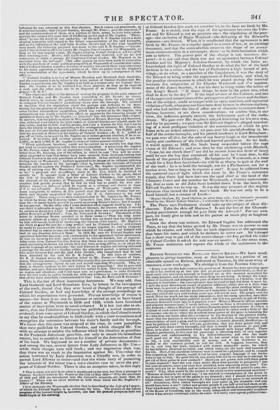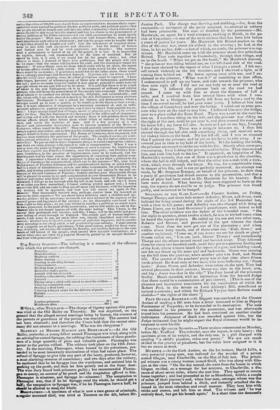REFORM SPEECH. MC TILE REVELEND SIDNEY Surrn..—We have much pleasure
in giving insertion, even at this late hour, to a portion of an admirable speech on Reform, delivered at Taunton, by the most witty of reasoners, some weeks ago. We abridge it from the Taunton Courier.
'Every year for this half century the question of Reform has been pressing upon
us till it has swelled up at last into this great and awful combination, so that almost every city and every borough in England are at this moment assembled for the same purpose, and are doing the same thing we are doing. It damps the ostentation of aignment and mitigates the pain of doubt to believe, as I believe, that the measure is inevitable ; the consequences may be good or bad, but dune it must be. I defy the most determined enenty of popular influence, either now or a little timefrom now, to prevent a Refurm in Parliament. Proud lips must swallow bitter potions. Time arguments and the practice tits I remember to have heard Mr. H uskisson say) which did very well twenty years ago, will not do now. The people read too MUCh, think too much, see too many newspapers, hear too many speeches, hare their eyes too intensely fired upon political events; but if it was possible to put off Parlia
m entary R m i efor a week ago, s it possible luny When a Monarch (whose amiable
and popular manners have, I verily believe, saved us from a revolution) approves the measure,—when a Minister of exalted character plans and fashions it—when a Cabinet of such varied talent and disposition protect it—when such a body of time aristocracy vote for it—when the hundred-horse power of the press is labouring fos it—who does not know after this (whatever be the decision of the present Parliament) that the measure is virtually carried; and that all the struggle between such annunciation of such a plan, and its completion, is tumult, disorder, disaffection—it may be political ruin ? They tell you, gentlemen, that you have grown rich antipowerful with these rotten boroughs, and that it would be madness to part with them, or to alter a constitution which had produced such happy effects. There. happens, gentlemen, to live near my parsonage a labouring matt, of very superior character and understanding to his fellow-labourers, and who has madesuch good use of that superiority, that Ile has saved what is, for his station. in life, a very considerable sum of money, and if his existence is extended to the common period, be will die rich. It happens, however, that he is, and long has been, troubled with violent stomacbic pains, for whicts. he has hitherto obtained no relief, and which realty are the bane and torment of his life. Now, if my excellent labourer were to send for a physician, and to consult him respecting this malady, would it not be very singular language if our doctor were to say to him, ' My good friend, you surely will uot been rash as to attempt to get rid of these pains in your stomach ! Have you not grown rich with these pains. in your stomach have not you risen under them from poverty to prosperity has not your situation, since you were first attacked, been improving every year 1 You. surely will not be so foolish and so indiscreet as to part with the pains in your stomach?' Why, what would be the answer of the rustic to this nonsensical monition S-• ' Monster of rhubarb,' he would say,' I am notrich in consequence of the pains inmy stomach, but in spite of the pains in my stomach ; and I should have been ten, times richer, and lifty times happier, if 1 had never had any pains in my stomach at alt.' Gentlemen, these rotten boroughs are your pains in„, the stomach—and yozr would have been a much richer and greater people if you had never had them at allYour wealth and your p...wer have been owing, not to the debased anti corrupted parts or the House of Commons, but to the many independent and honourable members . whom Mat; always contained within its wails. Hit really were agreat political inaus
welSnithat cities of 100,000 men should have no representatives because those representatives were wanted for political ditches, political walls, and political parks—that the people should be bought and sold like any other commodity—that a retired merchant should be able to go into the market and buy ten shares in the government of twenty millions of his fellow-subjects—yet can such asseverations be made openly Ilene the people ? Wise men, men conversant with human affairs, may whisper sesitheories to each other in retirement ; but can the people ever be taught that it is nen they should be bought and sold/ Can the vehemence of eloquent dem onuts be met with such arguments and theories 1 Can the doubts of honest awl limited men be met by such arguments and theories ? The moment nut a government is looked at by all the people, it is lost. It is impossible to explain, defend, and recommend it to the mass of mankind. But all would be well, it is said, if we would but let the people alone ; but chat ea..mnee is there. I demand of these wise politicians, that the people will ever tee 1st alone—that the orator will lay down his craft, and the demagogue forget his eesemsF.ag ? If many things were let alone which never will be let alone, the aspect
t mean affairs would be a little varied. If the winds would let the waves alone, these would be no storms ; if gentlemen would but let the ladies alone, there would ho as Unhappy marriages and deserted damsels. If persons who can reason no better nteretleis would leave speaking alone, the school of eloquence might be improved. I have liner hopes, however, of witnessing any of these acts of forbearance, particularly Wu tut ; and so we must, however foolish it may appear, proceed to make laws for avrtple whom we are sure will not be let alone. It is said that there is to be a lack at Went in the new Parliament,—it is to be composed of ordinary and inferior yereons, who will bring the government of the country into contempt. But the best tet all talents is to conduct our affairs honestly, diligently, and economically ; and t.1. talent will, I am sure, abound as much in the new Parliament as many previous Asawments. Parliament is not a school for rhetoric and declamation, where a asetsoger would go to hear a speech, as he would go to the Opera to hear a song ; rem h• it were otherwise, if eloquence be a necessary ornament of, and an indispensable adjunct to, popular assemblies, can it ever be absent from popular assent. fain I have always found that all things, moral or physisal, grow best in the soil best snanisf,e them. The free Parliament of a free people is the native soil of eloquence; atolls that soil it will ever flourish and abound; there it will produce those intelbecesal effects which drive before them whole tribes of nations of the human res-, and settle the destinies of man. And if a few persons of a less essesset and aristocratic description were to become members of the House of ranesonn, where would bribe evil ? They would probably understand the common pteople a great deal better, and in this way the feelings and interests of all classes of people would he better represented. The House of Commons, thus organized, will swans more faithfully the opinions of the people. The people, it seems, are sometirnee grossly mistaken ; but are kings never mistaken ? Are the higher orders never netseeXen ? To put an end to those enormous abuses, is called corporation robbery, tend there are some persons wild enough to talk of compensation. When I was a yeawg man, the place in England, I remember, as most notorious for highwaymen and their exploits was Finchley Common, near the metropolis ; but Finchley Comanon, Gentlemen, in the progress of improvement, came to be enclosed, and the
• lawmen lost by these means the opportunity of exercising their gallant voca
tion. I remember a friend of mine proposed to draw up for them a petition to the lIcaz.p. of Commons for compensation, which ran in this manner= We, your loyal isteJiwaymen of Finchley Common and its neighbourhood, having at great expense &id in a stock of blunderbusses, pistols, and other instruments, for plundering the pzetilie, and finding ourselves impeded in the exercise of our calling by the said en. token= of the said Common of Fincilley, humbly petition your Honourable House
• be pleased to assign to us such compensation as your Honourable House in its
st5see' zn and justice may think fit.' An honourable baronet says, 'If Parliament is Cr:Swayed, I will go to my borough with the bill in my baud, and will say—I know (se naerime you have committed ; I found nothing proved against you ; I voted agasiest the Bill, and am come to fling myself upon your kindness, with the hope that asy eenduct will be approved, and that you will return me again to Parliament.' That honourable baronet may, perhaps, receive from his borough an sneszer he little expects= We are above being bribed by such a childish and unfunny artifice : we do not choose to consult our own interest at the expense of the seminal peace and happiness of the country ; we are thoroughly convinced a Reason might to take place ; we are very willing to sacrifice a privilege we ought never to base possessed, to the good of the community, and we will return no one to Par/lament who is not deeply impressed with the same feeling.' This, I hope, is the answer that gentleman will receive; and this, I hope, will be the noble and genesons feeling of every borough in England. The greater part of human improvements, I am sorry to say, are made after war, tumult, bloodshed, and civil cotnmotion : mankind seem to aged to every species of gratuitous happinvss, and to consider way advantage as too cheap which is not purchased by some calamity. I shall esteem it as a singular act of God's providence, if this great nation, guided by these warnings of history, not waiting till tumult for Reform, not trusting Reform to the rude lbw& of the lowest of the people, shall amend their decayed institutions, at a pniod when they are ruled by a popular Monarch, guided by an upright Miuister• as:ablest with profound peace."



























 Previous page
Previous page